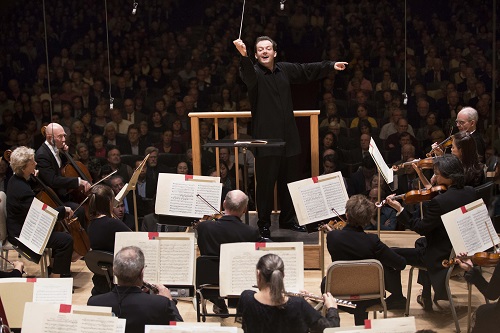
 Germany Musikfest Berlin 2016 [2} – Debussy, Varèse. Berlioz: Berliner Philharmoniker / Andris Nelsons (conductor), Philharmonie, Berlin, 9.9.2016. (MC)
Germany Musikfest Berlin 2016 [2} – Debussy, Varèse. Berlioz: Berliner Philharmoniker / Andris Nelsons (conductor), Philharmonie, Berlin, 9.9.2016. (MC)

Debussy: Prélude à l’après-midi d’un faune
Varèse: Arcana, for large orchestra, rev 1960
Berlioz: Symphonie fantastique
Standard fare such as the Debussy and Berlioz has been performed by the Berliner Philharmoniker and most orchestras on a regular basis; works the players know inside out. The programme planners came up trumps balancing two mainstays of the repertoire with the inclusion of the rarely encountered Arcana from the pen of the innovative Varèse. Nonetheless as I took my seat in the packed hall part of me I wondered if Nelsons, who was in 2015 under consideration by the orchestra for the role of principal conductor, could produce a performance that didn’t feel workaday.
Inspired by the poem L’après-midi d’un faune by Stéphane Mallarmé, Debussy created a magical soundworld with his Prélude à l’après-midi d’un faune a landmark work in music history. With complete assurance Nelsons brought out the haunting beauty and shimmering intimacy of Debussy’s mysterious, impressionistic soundworld. Striking was the playing of the flute, oboe and clarinet; immaculate throughout.
The opportunity of hearing Arcana scored for large orchestra from the Paris born, American composer Edgar Varèse doesn’t come around too often, which is a shame as it’s a work which makes a tremendous impression. Rejecting traditional methods, the controversial Varèse explored innovative developments of composition in a career that resulted in a relatively small number of works. Written in 1925/27 the composer attached to the score a quotation from Paracelsus, the 16th century Alchemist. How the orchestra relished this curious yet fascinating score full of intense energy containing a series of thunderous crashes in the exciting final pages. A cacophony of sound at various times I felt I could hear in it influences of Gershwin’s Cuban Overture and An American in Paris, Bernstein’s West Side Story and Stravinsky’s Rite of Spring.
The principal work of the evening Berlioz’s Symphonie Fantastique has an enduring popularity on concert programmes. Having heard the score several times in the last few seasons any sense of overload was soon dispelled by Nelsons’ riveting reading of a work that challenges an orchestra on several levels. Richly scored and ground-breaking in its day Berlioz’s programmatic score portrays the composer’s own self-destructive passion for the actress Harriet Smithson whom he was later to marry. Enthusiastic and buoyant Nelsons’ conducting contained an astute choice of tempi and wide dynamics, revealing as much detail as I have heard in the score. Conspicuous too was the poise and precision of the orchestra that was clearly in its element with this romantic showpiece. Memorable episodes included in the sparkling ‘A Ball’ – with a wonderful lilt given to the Ländler by the glorious string section and the enchanting effect of the dark low strings. Hard to fault was the resolute and rasping brass contribution and the burbling bassoons in ‘March to the Scaffold’. I relished too the witty high spirits of the final movement ‘Dream of the Witches’ Sabbath’ and the weighty conclusion was completely convincing. Nelsons came up trumps conducting invigorating performances without even a whiff of routine.
Michael Cookson
